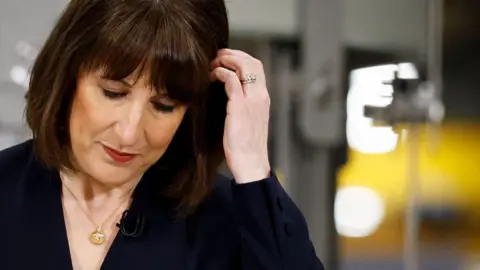Reeves' intervention in car loans case rejected
 Getty Images
Getty ImagesChancellor Rachel Reeves' attempt to intervene in a landmark case over controversial car loans has been blocked by the UK's highest court.
The Supreme Court case, which is set for April, will hear an appeal by finance firms after the Court of Appeal ruled that it was unlawful for lenders to pay a commission to a dealer without a customer's consent.
Furthermore, it said that when customers were not informed of the arrangement they should be compensated, leading to estimates that the industry could be forced to pay out as much as £30bn.
The Treasury, which stepped in amid concerns about the possible impact on the wider car financing sector, said it respected the Supreme Court's decision.
The vast majority of new cars, and many second-hand ones, are bought with finance agreements.
In 2021, the Financial Conduct Authority (FCA) banned deals in which the dealer received a commission from the lender, based on the interest rate charged to the customer.
It said this provided an incentive for a buyer to be charged a higher-than-necessary interest rate.
Since January, it has been considering whether compensation should be paid to people who had these deals before 2021.
That has created the prospect of banks and other lenders having to make payouts totalling millions of pounds.
Last month, a decision at the Court of Appeal broadened the net of those who could receive compensation.
Some analysts estimate the bill could end up being the largest compensation scheme linked to financial products since the payment protection insurance (PPI) saga.
The government said last month that, while it wanted to make sure customers get redress, it also wanted the motor sector to be able to continue "supporting millions of motorists to own vehicles".
It expressed concerns at the time that the size of the compensation bill for lenders could undermine the competitiveness of UK banks.
A spokesperson for the Treasury said on Monday: "We respect the Court's decision to not grant our application to intervene... and will monitor it closely".
The court also rejected applications to intervene in the case from Consumer Voice, a compensation advisor, and the Finance & Leasing Association trade body.
It approved applications from the FCA and trade body the National Franchised Dealers Association.
The court's time is limited, so it sometimes rejects interventions from parties who it believes may give similar evidence.
"It is very unusual for the government to intervene in court decisions in which it is not directly concerned, especially to pursue policy issues," said Wayne Gibbard, who leads the automotive finance practice at law firm Shoosmiths.
He said that the Supreme Court case in April marked the final step in the legal process around "secrecy and payments", and added that after the court's conclusion, the FCA would consider whether, and what type of redress is paid, if at all.
"Most likely we will see that around May time, and that's likely to involve some sort of consultation," he said. The FCA has set itself the end of 2025 as a deadline to resolve all of the cases.
In early morning trade on Tuesday, Close Brothers Group's share price was down around 2%, while Lloyds Banking Group was up by 0.7%. Both suffered sharp falls on Monday.
